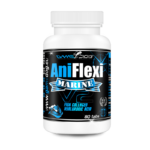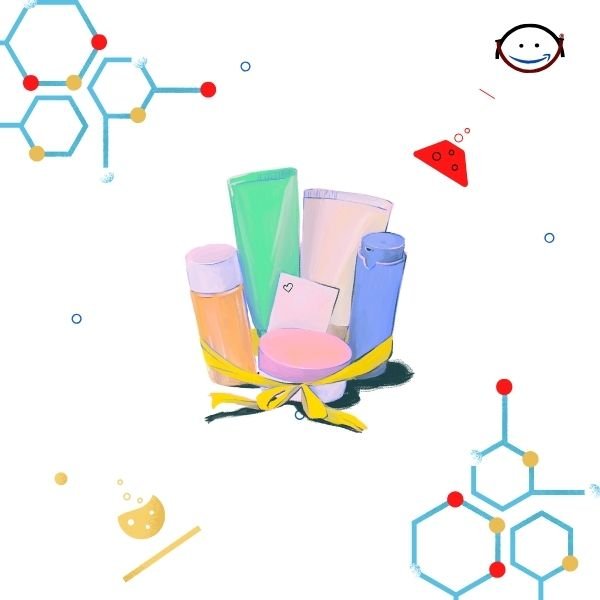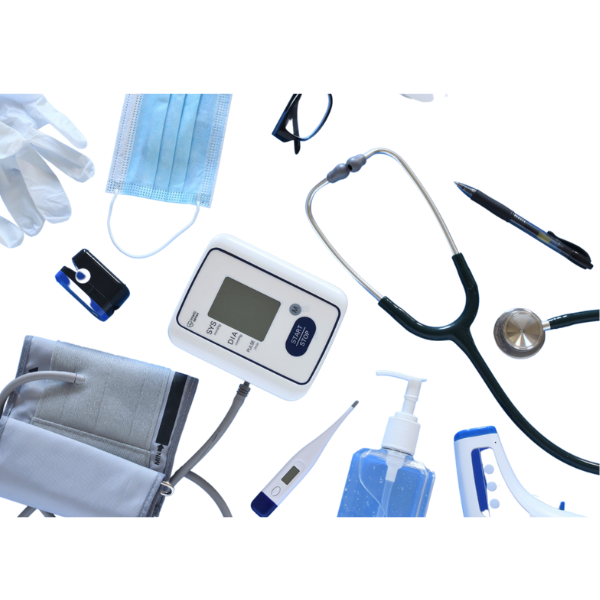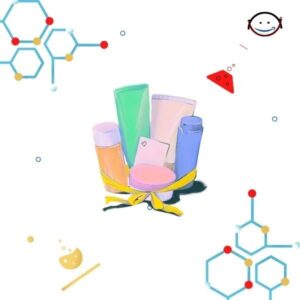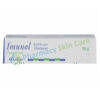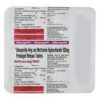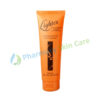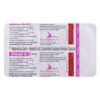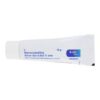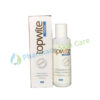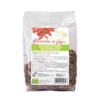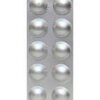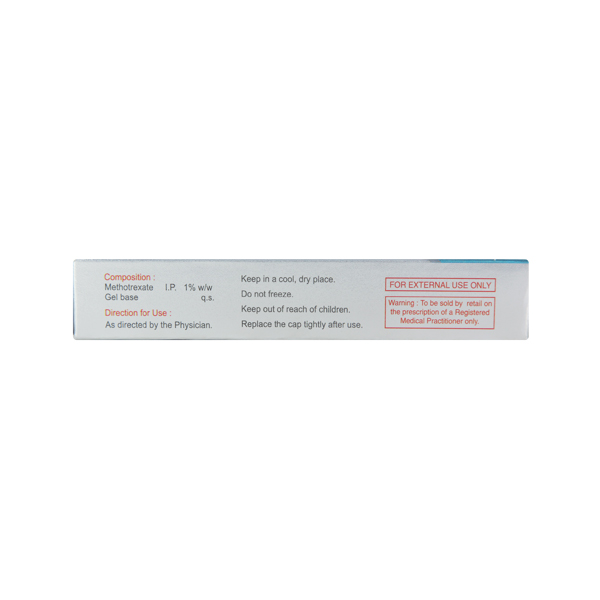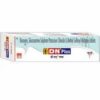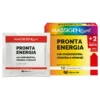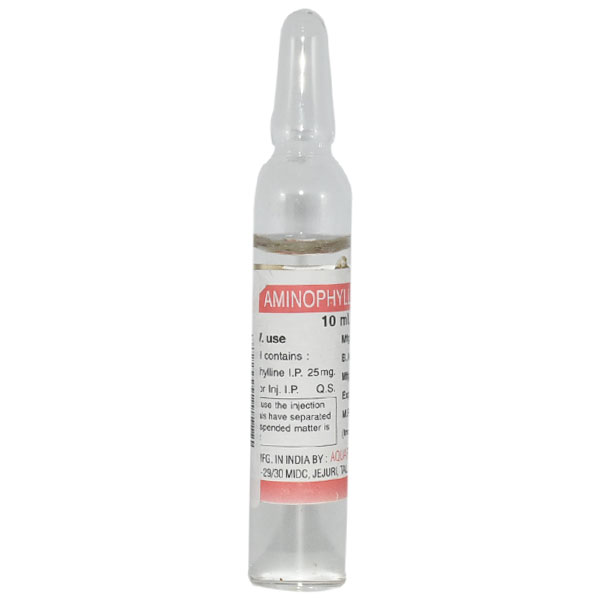-
Imunol Ointement 10gram ₦460.00 QTY: 1
-
GLITARAY M 4/500MG STRIP OF 10 TABLETS ₦3,568.25 QTY: 1
-
Lightex Face Wash 120ml ₦950.00 QTY: 1
-
PRIRAB D STRIP OF 10 CAPSULES ₦1,724.25 QTY: 1
-
S GEL TUBE OF 10GM ₦1,343.75 QTY: 1
-
Topwhite 120ml Cleanser Facewash ₦725.00 QTY: 1
-
SIMBIOTIC B LOTION ₦1,753.25 QTY: 1
-
Simple & Organic Dried Goji Berries 250g ₦22,230.00 QTY: 1
-
ANGIODAY 5mg Tablet 20?s ₦44,200.00 QTY: 1
-
RAVOZ 20MG TABLET ₦2,246.00 QTY: 1
-
Dermotrex Gel 30gm ₦47,600.00 QTY: 1
-
DN PLUS TABLET ₦3,093.75 QTY: 1
-
Sport Ready Energy Massigen Sport 12 Sachets ₦9,842.00 QTY: 1
-
AMINOPHYLLINE (AQUA FINE) Injection 10ml ₦23,800.00 QTY: 1
Customer matched zone "Lagos Delivery Options"
Sort by:
145–160 of 4627 Results
-
SaleAncor Plus 5 mg+6.25 mgBisoprolol plus Hydrochlorothiazide is indicated in the treatment of Hypertension.Theropeutic ClassCombined antihypertensive preparationsPharmacologyBisoprolol Fumarate and Hydrochlorothiazide have been used individually and in combination for the treatment of hypertension. The antihypertensive effects of these agents are additive; Hydrochlorothiazide 6.25 mg significantly increases the antihypertensive effect of Bisoprolol Fumarate. The incidence of hypokalemia with the Bisoprolol Fumarate and Hydrochlorothiazide 6.25 mg combination is significantly lower than with Hydrochlorothiazide 25 mg. Bisoprolol Fumarate is a ?1-selective (cardioselective) adrenoceptor blocking agent without significant membrane stabilizing or intrinsic sympathomimetic activities in its therapeutic dose range. Hydrochlorothiazide is a benzothiadiazine diuretic. Thiazides affect renal tubular mechanisms of electrolyte reabsorption and increase excretion of sodium and chloride in approximately equivalent amountsDosage & Administration of Ancor Plus 5 mg+6.25 mgBisoprolol is an effective treatment of hypertension in once-daily doses of 2.5 to 40 mg, while Hydrochlorothiazide is effective in doses of 12.5 to 50 mg. In clinical trials of Bisoprolol/Hydrochlorothiazide combination therapy using Bisoprolol doses of 2.5 to 20 mg and Hydrochlorothiazide doses of 6.25 to 25 mg, the antihypertensive effects increased with increasing doses of either component. Initial Therapy: Antihypertensive therapy may be initiated with the lowest dose of this conbination, one 2.5/6.25 mg tablet once daily. Subsequent titration (14 day intervals) may be carried out with this tablets up to the maximum recommended dose 20/12.5 mg once daily, as appropriate. Replacement Therapy: The combination may be substituted for the titrated individual components. Therapy Guided by Clinical Effect: A patient whose blood pressure is not adequately controlled with 2.5-20 mg Bisoprolol daily may instead be given this conbination. Patients whose blood pressures are adequately controlled with 50 mg of hydrochlorothiazide daily, but who experience significant potassium loss with this regimen, may achieve similar blood pressure control without electrolyte disturbance if they are switched to this conbination.Dosage of Ancor Plus 5 mg+6.25 mgBisoprolol is an effective treatment of hypertension in once-daily doses of 2.5 to 40 mg, while Hydrochlorothiazide is effective in doses of 12.5 to 50 mg. In clinical trials of Bisoprolol/Hydrochlorothiazide combination therapy using Bisoprolol doses of 2.5 to 20 mg and Hydrochlorothiazide doses of 6.25 to 25 mg, the antihypertensive effects increased with increasing doses of either component. Initial Therapy: Antihypertensive therapy may be initiated with the lowest dose of this conbination, one 2.5/6.25 mg tablet once daily. Subsequent titration (14 day intervals) may be carried out with this tablets up to the maximum recommended dose 20/12.5 mg once daily, as appropriate. Replacement Therapy: The combination may be substituted for the titrated individual components. Therapy Guided by Clinical Effect: A patient whose blood pressure is not adequately controlled with 2.5-20 mg Bisoprolol daily may instead be given this conbination. Patients whose blood pressures are adequately controlled with 50 mg of hydrochlorothiazide daily, but who experience significant potassium loss with this regimen, may achieve similar blood pressure control without electrolyte disturbance if they are switched to this conbination.Interaction of Ancor Plus 5 mg+6.25 mgThis combination drug may potentiate the action of other antihypertensive agents used concomitantly. This combination drug should not be combined with other beta-blocking agents. Patients receiving catecholamine-depleting drugs, such as reserpine or guanethidine, should be closely monitored because the added beta-adrenergic blocking action of Bisoprolol Fumarate may produce excessive reduction of sympathetic activity. In patients receiving concurrent therapy with clonidine, if therapy is to be discontinued, it is suggested that this combination drug be discontinued for several days before the withdrawal of clonidine. This combination drug should be used with caution when myocardial depressants or inhibitors of AV conduction, such as certain calcium antagonists (particularly of the phenylalkylamine [verapamil] and benzothiazepine [diltiazem] classes) or antiarrhythmic agents, such as disopyramide, are used concurrently. Both digitalis glycosides and beta-blockers slow atrioventricular conduction and decrease heart rate. Concomitant use can increase the risk of bradycardia.ContraindicationsIt is contraindicated in patients in cardiogenic shock, overt cardiac failure, second or third degree AV block, marked sinus bradycardia, anuria and hypersensitivity to either component of this product or to other sulfonamide-derived drugs.Side Effects of Ancor Plus 5 mg+6.25 mgGenerally well tolerated. Most side effects have been mild and transient. Side effects which may occur: fatigue, dizziness, headache, bradycardia, arrhythmia, peripheral ischemia, chest pain, palpitations, rhythm disturbances, cold extremities, claudication, orthostatic hypotension, diarrhoea, constipation, nausea, dyspepsia, rhinitis, pharyngitis etc.Pregnancy & LactationUse in Pregnancy: Pregnancy Category C. There are no adequate and well-controlled studies in pregnant women. Bisoprolol Fumarate and Hydrochlorothiazide should be used during pregnancy only if the potential benefit justifies the risk to the fetus. Use in Nursing Mothers: Bisoprolol Fumarate alone or in combination with Hydrochlorothiazide has not been studied in nursing mothers. Thiazides are excreted in human breast milk. Small amounts of Bisoprolol Fumarate have been detected in the milk of lactating rats. Because of the potential for serious adverse reactions in nursing infants, a decision should be made whether to discontinue nursing or to discontinue the drug, taking into account the importance of the drug to the mother.Precautions & WarningsHyperuricemia or acute gout may be precipitated in certain patients receiving thiazide diuretics. Warning signs or symptoms of fluid and electrolyte imbalance include dryness of mouth, thirst, weakness, lethargy, drowsiness, restlessness, muscle pains or cramps, muscular fatigue, hypotension, oliguria, tachycardia and gastrointestinal disturbances such as nausea and vomiting. Hypokalemia may develop. If withdrawal of this combination therapy is planned, it should be achieved gradually over a period of about 2 weeks. Patients should be carefully observed.Overdose Effects of Ancor Plus 5 mg+6.25 mgThere are limited data on overdose with this combination product. The most frequently observed signs expected with overdosage of a beta-blocker are bradycardia and hypotension. Lethargy is also common and with severe overdoses, delirium, coma, convulsions, and respiratory arrest have been reported to occur. Congestive heart failure, bronchospasm, and hypoglycemia may occur. With thiazide diuretics, acute intoxication is rare. The most prominent feature of overdose is acute loss of fluid and electrolytes. Signs and symptoms include cardiovascular (tachycardia, hypotension, shock), neuromuscular (weakness, confusion, dizziness, cramps of the calf muscles, paresthesia, fatigue, impairment of consciousness), gastrointestinal (nausea, vomiting, thirst), renal (polyuria, oliguria, or anuria), and laboratory findings (hypokalemia, hyponatremia, hypochloremia, alkalosis, increased BUN [especially in patients with renal insufficiency]).Storage ConditionsKeep below 30?C temperature, away from light & moisture. Keep out of the reach of children.Drug ClassesCombined antihypertensive preparationsMode Of ActionBisoprolol Fumarate and Hydrochlorothiazide have been used individually and in combination for the treatment of hypertension. The antihypertensive effects of these agents are additive; Hydrochlorothiazide 6.25 mg significantly increases the antihypertensive effect of Bisoprolol Fumarate. The incidence of hypokalemia with the Bisoprolol Fumarate and Hydrochlorothiazide 6.25 mg combination is significantly lower than with Hydrochlorothiazide 25 mg. Bisoprolol Fumarate is a ?1-selective (cardioselective) adrenoceptor blocking agent without significant membrane stabilizing or intrinsic sympathomimetic activities in its therapeutic dose range. Hydrochlorothiazide is a benzothiadiazine diuretic. Thiazides affect renal tubular mechanisms of electrolyte reabsorption and increase excretion of sodium and chloride in approximately equivalent amountsPregnancyUse in Pregnancy: Pregnancy Category C. There are no adequate and well-controlled studies in pregnant women. Bisoprolol Fumarate and Hydrochlorothiazide should be used during pregnancy only if the potential benefit justifies the risk to the fetus. Use in Nursing Mothers: Bisoprolol Fumarate alone or in combination with Hydrochlorothiazide has not been studied in nursing mothers. Thiazides are excreted in human breast milk. Small amounts of Bisoprolol Fumarate have been detected in the milk of lactating rats. Because of the potential for serious adverse reactions in nursing infants, a decision should be made whether to discontinue nursing or to discontinue the drug, taking into account the importance of the drug to the mother.Sku: 1736102905-3117
Ancor Plus5 mg+6.25 mg
₦7,150.00Original price was: ₦7,150.00.₦6,506.50Current price is: ₦6,506.50.₦7,150.00Original price was: ₦7,150.00.₦6,506.50Current price is: ₦6,506.50. Add to basket Quick View -
SaleAncor 2.5 mgAncor 2.5 mg is indicated in- Hypertension Angina Moderate to severe heart failureTheropeutic ClassAnti adrenergic agent (Beta blockers), Beta-adrenoceptor blocking drugs, Beta-blockersPharmacologyBisoprolol Hemifumarate is the most selective ?1 blocker. It displays highest level of affinity for the ?1 receptor than any other beta-blocker available up to now. Selectively blocks ?1 adrenergic receptor in the heart and vascular smooth muscle and reduces heart rate and cardiac output resulting in decrease of arterial hypertension. Lipid metabolism can be adversely affected by ?-blockers, in patients with non-?1 selective ?1-blocker, but Bisoprolol does not cause any change in the cholesterol fraction including the cardioprotective HDL-cholesterol, in long-term therapy.Dosage & Administration of Ancor 2.5 mgHypertension: The dose of Bisoprolol must be individualized to the needs of the patient. The usual starting dose is 5 mg once daily. In some patients, 2.5 mg may be an appropriate starting dose. If the antihypertensive effect of 5 mg is inadequate, the dose may be increased to 10 mg and then, if necessary, to 20 mg once daily. Angina: Usually 10 mg once daily (5 mg may be adequate in some patients) max 20 mg daily. Heart Failure: Initially 1.25 mg once daily (in the morning) for 1 week then, if well tolerated, increased to 2.5 mg once daily for 1 week, then 3.75 mg once daily for 1 week, then 5 mg once daily for 4 weeks, then- 7.5 mg once daily for 4 weeks, then 10 mg once daily maximum 10 mg daily.Interaction of Ancor 2.5 mgBisoprolol should not be combined with other ?-blocking agents.ContraindicationsIn patients with cardiogenic shock, overt heart failure, second or third degree A-V block, right ventricular failure secondary to pulmonary hypertension and sinus bradycardia.Side Effects of Ancor 2.5 mgGastro-intestinal disturbances, bradycardia, hypotension, headache, fatigue, sleep disturbances, dizziness, vertigo, thrombocytopenia, visual disturbances, alopecia may be occurred.Pregnancy & LactationThe safety of Ancor 2.5 mg during pregnancy has not been established.?No data is available for lactation.Precautions & WarningsMonitoring of renal, hepatic and hematopoietic function should be performed at regular intervals during long-term treatment with bisoprolol.Storage ConditionsKeep in a dry place away from light and heat. Keep out of the reach of children.Sku: 1736107545-4480
Ancor2.5 mg
₦3,850.00Original price was: ₦3,850.00.₦3,503.50Current price is: ₦3,503.50.₦3,850.00Original price was: ₦3,850.00.₦3,503.50Current price is: ₦3,503.50. Add to basket Quick View -
SaleAncor 5 mgAncor 5 mg is indicated in- Hypertension Angina Moderate to severe heart failureTheropeutic ClassAnti adrenergic agent (Beta blockers), Beta-adrenoceptor blocking drugs, Beta-blockersPharmacologyBisoprolol Hemifumarate is the most selective ?1 blocker. It displays highest level of affinity for the ?1 receptor than any other beta-blocker available up to now. Selectively blocks ?1 adrenergic receptor in the heart and vascular smooth muscle and reduces heart rate and cardiac output resulting in decrease of arterial hypertension. Lipid metabolism can be adversely affected by ?-blockers, in patients with non-?1 selective ?1-blocker, but Bisoprolol does not cause any change in the cholesterol fraction including the cardioprotective HDL-cholesterol, in long-term therapy.Dosage & Administration of Ancor 5 mgHypertension: The dose of Bisoprolol must be individualized to the needs of the patient. The usual starting dose is 5 mg once daily. In some patients, 2.5 mg may be an appropriate starting dose. If the antihypertensive effect of 5 mg is inadequate, the dose may be increased to 10 mg and then, if necessary, to 20 mg once daily. Angina: Usually 10 mg once daily (5 mg may be adequate in some patients) max 20 mg daily. Heart Failure: Initially 1.25 mg once daily (in the morning) for 1 week then, if well tolerated, increased to 2.5 mg once daily for 1 week, then 3.75 mg once daily for 1 week, then 5 mg once daily for 4 weeks, then- 7.5 mg once daily for 4 weeks, then 10 mg once daily maximum 10 mg daily.Interaction of Ancor 5 mgBisoprolol should not be combined with other ?-blocking agents.ContraindicationsIn patients with cardiogenic shock, overt heart failure, second or third degree A-V block, right ventricular failure secondary to pulmonary hypertension and sinus bradycardia.Side Effects of Ancor 5 mgGastro-intestinal disturbances, bradycardia, hypotension, headache, fatigue, sleep disturbances, dizziness, vertigo, thrombocytopenia, visual disturbances, alopecia may be occurred.Pregnancy & LactationThe safety of Ancor 5 mg during pregnancy has not been established.?No data is available for lactation.Precautions & WarningsMonitoring of renal, hepatic and hematopoietic function should be performed at regular intervals during long-term treatment with bisoprolol.Storage ConditionsKeep in a dry place away from light and heat. Keep out of the reach of children.Sku: 1736107759-4545
Ancor5 mg
₦6,325.00Original price was: ₦6,325.00.₦5,755.75Current price is: ₦5,755.75.₦6,325.00Original price was: ₦6,325.00.₦5,755.75Current price is: ₦5,755.75. Add to basket Quick View -
SaleAndep 100 mgAndep 100 mg is indicated in Depressive illness, Obsessive-compulsive disorder, Post-traumatic stress disorder, Panic disorderTheropeutic ClassSSRIs & related anti-depressant drugsPharmacologyAndep 100 mg has potent and selective inhibitory action on CNS neuronal reuptake of 5-HT resulting in increased 5-HT concentrations at the synaptic clefts, leading to facilitation of its sustained activity at the postsynaptic receptor sites. It ultimately results in an improvement of depression. Reduction of Serotonin turnover in brain by Andep 100 mg is also another contributing fact implicated in its action. Its prolonged elimination half-life offers a benefit of once daily administration.Dosage & Administration of Andep 100 mgDepressive illness: Adult: Initially 50 mg daily, increased if necessary by increments of 50 mg over several weeks to maximum 200 mg daily. Usual maintenance dose is 50 mg daily. Child and adolescent less than 18 years:?Not recommended. Obsessive-compulsive disorder: Adult and adolescent over 13 years: Initially 50 mg daily, increased if necessary in steps of 50 mg over several weeks. Usual dose range is 50-200 mg daily. Child (6-12 years): Initially 25 mg daily, increased to 50 mg daily after 1 week, further increased if necessary in steps of 50 mg at intervals of at least 1 week (maximum 200 mg daily).? Post-traumatic stress disorder: Adult: Initially 25 mg daily, increased after 1 week to 50 mg daily; if response is partial and if drug is tolerated, dose can be increased in steps of 50 mg over several weeks to maximum 200 mg daily. Child and adolescent less than 18 years: Not recommended.? Interaction of Andep 100 mgPotential effects of co-administration of drugs that are highly bound to plasma proteins- As Andep 100 mg is tightly bound to plasma protein, the administration of Andep 100 mg to a patient taking another drug which is tightly bound to protein, (e.g. warfarin, digitoxin) may cause a shift in plasma concentrations potentially resulting in an adverse effect. Conversely adverse effects may result from displacement of protein bound Andep 100 mg by other tightly bound drugs. Andep 100 mg may interact with other drugs such as Cimetidine, CNS active drugs like Diazepam, Hypoglycemic drugs, Atenolol etc.ContraindicationsAndep 100 mg is contraindicated in patients with a known hypersensitivity to Andep 100 mg or any of the excipients of drug.Side Effects of Andep 100 mgAndep 100 mg may cause side effects like upset stomach, diarrhoea, constipation, vomiting, dry mouth, loss of appetite, weight changes, drowsiness, dizziness, headache, pain, burning or tingling in the hands or feet, excitement, sore throat etc.Pregnancy & LactationPregnancy: Although animal studies did not provide any evidence of teratogenicity, the safety of Andep 100 mg during human pregnancy has not been established.?Lactation: Andep 100 mg is known to be excreted in breast milk. Its effects on the nursing infant have not yet been established. If treatment with Andep 100 mg is considered necessary, discontinuation of breast-feeding should be considered.Precautions & WarningsPrecaution should be taken in case of liver problems, kidney diseases, seizures, heart problems and any allergies. This drug may cause dizziness or drowsiness. Caution should be taken in activities requiring alertness such as driving or using machinery. Caution is advised while using this product in the elderly because they may be more sensitive to the effects of the drug. Do not take this drug if you have taken monoamine oxidase inhibitor in the last five weeks.Storage ConditionsStore at 25? C.Sku: 1736102222-2916
Andep100 mg
₦5,500.00Original price was: ₦5,500.00.₦5,060.00Current price is: ₦5,060.00.₦5,500.00Original price was: ₦5,500.00.₦5,060.00Current price is: ₦5,060.00. Add to basket Quick View -
SaleAndep 50 mgAndep 50 mg is indicated in Depressive illness, Obsessive-compulsive disorder, Post-traumatic stress disorder, Panic disorderTheropeutic ClassSSRIs & related anti-depressant drugsPharmacologyAndep 50 mg has potent and selective inhibitory action on CNS neuronal reuptake of 5-HT resulting in increased 5-HT concentrations at the synaptic clefts, leading to facilitation of its sustained activity at the postsynaptic receptor sites. It ultimately results in an improvement of depression. Reduction of Serotonin turnover in brain by Andep 50 mg is also another contributing fact implicated in its action. Its prolonged elimination half-life offers a benefit of once daily administration.Dosage & Administration of Andep 50 mgDepressive illness: Adult: Initially 50 mg daily, increased if necessary by increments of 50 mg over several weeks to maximum 200 mg daily. Usual maintenance dose is 50 mg daily. Child and adolescent less than 18 years:?Not recommended. Obsessive-compulsive disorder: Adult and adolescent over 13 years: Initially 50 mg daily, increased if necessary in steps of 50 mg over several weeks. Usual dose range is 50-200 mg daily. Child (6-12 years): Initially 25 mg daily, increased to 50 mg daily after 1 week, further increased if necessary in steps of 50 mg at intervals of at least 1 week (maximum 200 mg daily).? Post-traumatic stress disorder: Adult: Initially 25 mg daily, increased after 1 week to 50 mg daily; if response is partial and if drug is tolerated, dose can be increased in steps of 50 mg over several weeks to maximum 200 mg daily. Child and adolescent less than 18 years: Not recommended.? Interaction of Andep 50 mgPotential effects of co-administration of drugs that are highly bound to plasma proteins- As Andep 50 mg is tightly bound to plasma protein, the administration of Andep 50 mg to a patient taking another drug which is tightly bound to protein, (e.g. warfarin, digitoxin) may cause a shift in plasma concentrations potentially resulting in an adverse effect. Conversely adverse effects may result from displacement of protein bound Andep 50 mg by other tightly bound drugs. Andep 50 mg may interact with other drugs such as Cimetidine, CNS active drugs like Diazepam, Hypoglycemic drugs, Atenolol etc.ContraindicationsAndep 50 mg is contraindicated in patients with a known hypersensitivity to Andep 50 mg or any of the excipients of drug.Side Effects of Andep 50 mgAndep 50 mg may cause side effects like upset stomach, diarrhoea, constipation, vomiting, dry mouth, loss of appetite, weight changes, drowsiness, dizziness, headache, pain, burning or tingling in the hands or feet, excitement, sore throat etc.Pregnancy & LactationPregnancy: Although animal studies did not provide any evidence of teratogenicity, the safety of Andep 50 mg during human pregnancy has not been established.?Lactation: Andep 50 mg is known to be excreted in breast milk. Its effects on the nursing infant have not yet been established. If treatment with Andep 50 mg is considered necessary, discontinuation of breast-feeding should be considered.Precautions & WarningsPrecaution should be taken in case of liver problems, kidney diseases, seizures, heart problems and any allergies. This drug may cause dizziness or drowsiness. Caution should be taken in activities requiring alertness such as driving or using machinery. Caution is advised while using this product in the elderly because they may be more sensitive to the effects of the drug. Do not take this drug if you have taken monoamine oxidase inhibitor in the last five weeks.Storage ConditionsStore at 25? C.Sku: 1736106939-4297
Andep50 mg
₦3,025.00Original price was: ₦3,025.00.₦2,783.00Current price is: ₦2,783.00.₦3,025.00Original price was: ₦3,025.00.₦2,783.00Current price is: ₦2,783.00. Add to basket Quick View -
SaleAndrocap 40 mgThe active substance of this preparation is turned into testosterone by your body. Testosterone is the natural male hormone, necessary for the normal growth, development and function of the male sex organs and for secondary male sex characteristics. Preparations containing Testosterone are usually prescribed ... Read moreThe active substance of this preparation is turned into testosterone by your body. Testosterone is the natural male hormone, necessary for the normal growth, development and function of the male sex organs and for secondary male sex characteristics. Preparations containing Testosterone are usually prescribed to replace the hormone if the body is unable to produce enough on its own. Testosterone are soft oval glossy capsules, transparent, orange-red colour, with an oily fill.Theropeutic ClassMale Sex hormones (Androgens)PharmacologyThe effects of testosterone in humans and other vertebrates occur by way of two main mechanisms: by activation of the androgen receptor (directly or as DHT), and by conversion to estradiol and activation of certain estrogen receptors. Free testosterone (T) is transported into the cytoplasm of target tissue cells, where it can bind to the androgen receptor, or can be reduced to 5?-dihydrotestosterone (DHT) by the cytoplasmic enzyme 5?-reductase. DHT binds to the same androgen receptor even more strongly than T, so that its androgenic potency is about 2.5 times that of T. The T-receptor or DHT-receptor complex undergoes a structural change that allows it to move into the cell nucleus and bind directly to specific nucleotide sequences of the chromosomal DNA. The areas of binding are called hormone response elements (HREs), and influence transcriptional activity of certain genes, producing the androgen effects.Dosage of Androcap 40 mgUsually, the dosage is 3-4 capsules daily during the first 2-3 weeks, followed by a gradual decrease to 1-3 capsules daily. You must take Testosterone with a meal. Swallow the capsules whole without chewing, using some water or other fluid. Take half of the daily dose in the morning and the other half in the evening. If the daily dose is an uneven number of capsules, take the larger number in the morning. If you have the impression that the effect of Testosterone is too strong or too weak, inform your doctor immediately.Administration of Androcap 40 mgIf you forget to take Testosterone, do not take a double dose to make up for the forgotten individual dose. When treatment with Testosterone is stopped, complaints as those before treatment may re-occur within a few weeks.Interaction of Androcap 40 mgFood allows Androcap 40 mg to be taken up by your body. Therefore, Testosterone must be taken with a meal. Other medicines may influence the effects of Testosterone or Testosterone may affect other medicines. You must tell your doctor or pharmacist if you are using (or intend to use) rifampicin (an antibiotic) or medicines for epilepsy or sleeplessness.ContraindicationsDo not take Testosterone If you have a tumour of the prostate or the breast. If you are hypersensitive (allergic) to Androcap 40 mg or any of the other ingredients of Testosterone. Side Effects of Androcap 40 mgIn general: increased sexual desire fluid retention in the tissues, usually marked by swelling of ankles or feet In men: prolonged abnormal, painful erection of the penis disturbed formation of sperm decreased amount of sperm with seminal discharge In elderly men: problems with passing urine In young boys: early sexual development erections occurring more often than normal enlarged penis disturbed growth Tell your doctor as soon as possible if any side-effect becomes troublesome or continues.Pregnancy & LactationPregnancy Category X: Studies in animals or human beings have demonstrated foetal abnormalities or there is evidence of foetal risk based on human experience or both, and the risk of the use of the drug in pregnant women clearly outweighs any possible benefit. The drug is contraindicated in women who are or may become pregnant.Precautions & WarningsExtra supervision by a doctor is necessary in the treatment of young boys, since Testosterone suppletion may cause early sexual development and disturb growth. Extra supervision by a doctor is also necessary in the treatment of elderly men, since male hormones may increase the size of the prostate gland. Medical checks may also be necessary for some other conditions. Therefore, tell your doctor if you have or have ever had: heart disease kidney disease high blood pressure epilepsy migraine headaches prostatic complaints, such as problems with passing urine. Overdose Effects of Androcap 40 mgIf you have taken several capsules at once, there is no need for great concern. However, you should consult your doctor. The oily substance in the capsule may cause diarrhoea.Storage ConditionsKeep Testosterone out of reach and sight of children. Store at 8?C-30?C. Store in the original package in order to protect from light. Do not use Testosterone after the expiry date stated on the package, sachet and blister.Drug ClassesMale Sex hormones (Androgens)Mode Of ActionTestosterone plays a key role in male sexual differentiation and is involved in regulation of hematopoiesis, body composition, and bone metabolism. As a result, testosterone replacement therapy in males with hypogonadism can result in improved sexual function, increased lean body mass, bone density, erythropoiesis, prostate size, and changes in lipid profiles.Testosterone is produced by Leydig cells and exerts it's effects by binding to androgen receptors throughout the body. Testosterone affects the voice, genitalia, mood, and influences muscle growth and protein expression. Accordingly, males with low levels of testosterone often experience decreased libido, fatigue, mood changes and dysphoria. Exogenous sources of testosterone are designed to mimic the effects of endogenous testosterone.Sku: 1736106640-4208
Androcap40 mg
₦13,750.00Original price was: ₦13,750.00.₦12,375.00Current price is: ₦12,375.00.₦13,750.00Original price was: ₦13,750.00.₦12,375.00Current price is: ₦12,375.00. Add to basket Quick View -
SaleAnfree 0.5 mg+10 mgAnfree 0.5 mg+10 mg tablet is indicated in- Anxiety Depression Apathy Psychogenic depression. Depressive neurosses. Masked depression. Psychosomatic affections accompanied by anxiety and apathy. Menopausal depressions. Dysphoria and depression in alcoholics and drug addicts.Theropeutic ClassCombined anxiolytics & anti-depressant drugsPharmacologyMaximum serum concentration is reached in about 4 hours after oral administration of Anfree 0.5 mg+10 mg. The half-life of Flupentixol is about 35 hours and that of Melitracen is about 19 hours. The combination of Flupentixol and Melitracen does not seem to influence the pharmacokinetic properties of the individual compounds. Flupenthixol primarily acts as a neuroleptic drug. The antipsychotic effect of Flupenthixol is achieved by mixed blockade of dopamine D1 and D2 receptors. In the mesolimbic dopamine system of the brain, this accounts for the antipsychotic action of this drug. Flupenthixol has other effects on CNS. In the chemoreceptor trigger zone, the dopamine blockade accounts for the antiemetic effect of the drug.Melitracen is a tricyclic antidepressant. It blocks the neuronal re-uptake of both serotonin and nor-epinephrine in the central nervous system, there by minimizing the symptoms of depression.Dosage & Administration of Anfree 0.5 mg+10 mgAdults: Usually 2 tablets daily, in morning and afternoon. In severe cases, the morning dose may be increased to 2 tablets.Elderly patients: 1 tablet in the morning. Maintenance dose: Usually 1 tablet in the morning or as directed by the physician.Dosage of Anfree 0.5 mg+10 mgAdults: Usually 2 tablets orally daily in the morning and noon. In severe cases, the morning dose may be increased to 2 tablets.Elderly patients: 1 tablet in the morning. Maintenance dose: Usually 1 tablet orally in the morning. In cases of insomnia or severe restlessness, additional treatment with a sedative in the acute phase is recommended.Interaction of Anfree 0.5 mg+10 mgThis tablet may enhance the response to alcohol, barbiturates and other CNS depressants. Simultaneous administration of MAO-inhibitors may cause hypertensive crises. Neuroleptics and thymoleptics reduce the antihypertensive effect of guanethidine and similar acting compounds and thymoleptics enhance the effects of adrenaline and noradrenaline.ContraindicationsThe immediate recovery phase after myocardial infarction. Defects in bundle-branch conduction. Untreated narrow-angle glaucoma. Acute alcohol, barbiturate and opiate intoxications. This tablet should not be given to patients who have received an MAO-inhibitor within two weeks. Not recommended for excitable or overactive patients since its activating effect may lead to exaggeration of these characteristics.Side Effects of Anfree 0.5 mg+10 mgIn the recommended doses side effects are rare. These could be transient restlessness and insomnia.Pregnancy & LactationThe safety of this drug has not been established in pregnancy and lactation.Precautions & WarningsIf previously the patient has been treated with tranquillizers with sedative effect these should be withdrawn gradually.Overdose Effects of Anfree 0.5 mg+10 mgIn cases of overdosage the symptoms of intoxications by melitracen, especially of anticholinergic nature, dominate. More rarely extrapyramidal symptoms due to flupentixol occur. Symptomatic and Supportive. Gastric lavage should be carried out as soon as possible and activated charcoal may be administered. Measures aimed at supporting the respiratory and cardiovascular systems should be instituted. Epinephrine (adrenaline) must not be used for such patients. Convulsions may be treated with diazepam and extrapyramidal symptoms with biperiden.Storage ConditionsStore at a temperature not exceeding 30?C in a dry place. Protect from light. Keep out of reach of children.Drug ClassesCombined anxiolytics & anti-depressant drugsMode Of ActionThis consists of two well known and well proven compounds: flupentixol-a neuroleptic with anxiolytic and antidepressant properties of its own when given in small doses, and melitracen-a bipolar thymoleptic with activating properties in low doses. In combination the compounds render a preparation with antidepressant, anxiolytic and activating properties. Maximal serum concentration is reached in about 4 hours after oral administration of flupentixol and in about 4 hours after oral administration of melitracen. The biological half-life of flupentixol is about 35 hours and that of melitracen is about 19 hours. The combination of Anfree 0.5 mg+10 mg does not seem to influence the pharmacokinetic properties of the individual compounds.PregnancyThis tablet should preferably not be given during pregnancy and lactation.Sku: 1736107247-4390
Anfree0.5 mg+10 mg
₦275.00Original price was: ₦275.00.₦250.25Current price is: ₦250.25. -
SaleAngenta 0.5 mg+10 mgAngenta 0.5 mg+10 mg tablet is indicated in- Anxiety Depression Apathy Psychogenic depression. Depressive neurosses. Masked depression. Psychosomatic affections accompanied by anxiety and apathy. Menopausal depressions. Dysphoria and depression in alcoholics and drug addicts.Theropeutic ClassCombined anxiolytics & anti-depressant drugsPharmacologyMaximum serum concentration is reached in about 4 hours after oral administration of Angenta 0.5 mg+10 mg. The half-life of Flupentixol is about 35 hours and that of Melitracen is about 19 hours. The combination of Flupentixol and Melitracen does not seem to influence the pharmacokinetic properties of the individual compounds. Flupenthixol primarily acts as a neuroleptic drug. The antipsychotic effect of Flupenthixol is achieved by mixed blockade of dopamine D1 and D2 receptors. In the mesolimbic dopamine system of the brain, this accounts for the antipsychotic action of this drug. Flupenthixol has other effects on CNS. In the chemoreceptor trigger zone, the dopamine blockade accounts for the antiemetic effect of the drug.Melitracen is a tricyclic antidepressant. It blocks the neuronal re-uptake of both serotonin and nor-epinephrine in the central nervous system, there by minimizing the symptoms of depression.Dosage & Administration of Angenta 0.5 mg+10 mgAdults: Usually 2 tablets daily, in morning and afternoon. In severe cases, the morning dose may be increased to 2 tablets.Elderly patients: 1 tablet in the morning. Maintenance dose: Usually 1 tablet in the morning or as directed by the physician.Dosage of Angenta 0.5 mg+10 mgAdults: Usually 2 tablets orally daily in the morning and noon. In severe cases, the morning dose may be increased to 2 tablets.Elderly patients: 1 tablet in the morning. Maintenance dose: Usually 1 tablet orally in the morning. In cases of insomnia or severe restlessness, additional treatment with a sedative in the acute phase is recommended.Interaction of Angenta 0.5 mg+10 mgThis tablet may enhance the response to alcohol, barbiturates and other CNS depressants. Simultaneous administration of MAO-inhibitors may cause hypertensive crises. Neuroleptics and thymoleptics reduce the antihypertensive effect of guanethidine and similar acting compounds and thymoleptics enhance the effects of adrenaline and noradrenaline.ContraindicationsThe immediate recovery phase after myocardial infarction. Defects in bundle-branch conduction. Untreated narrow-angle glaucoma. Acute alcohol, barbiturate and opiate intoxications. This tablet should not be given to patients who have received an MAO-inhibitor within two weeks. Not recommended for excitable or overactive patients since its activating effect may lead to exaggeration of these characteristics.Side Effects of Angenta 0.5 mg+10 mgIn the recommended doses side effects are rare. These could be transient restlessness and insomnia.Pregnancy & LactationThe safety of this drug has not been established in pregnancy and lactation.Precautions & WarningsIf previously the patient has been treated with tranquillizers with sedative effect these should be withdrawn gradually.Overdose Effects of Angenta 0.5 mg+10 mgIn cases of overdosage the symptoms of intoxications by melitracen, especially of anticholinergic nature, dominate. More rarely extrapyramidal symptoms due to flupentixol occur. Symptomatic and Supportive. Gastric lavage should be carried out as soon as possible and activated charcoal may be administered. Measures aimed at supporting the respiratory and cardiovascular systems should be instituted. Epinephrine (adrenaline) must not be used for such patients. Convulsions may be treated with diazepam and extrapyramidal symptoms with biperiden.Storage ConditionsStore at a temperature not exceeding 30?C in a dry place. Protect from light. Keep out of reach of children.Drug ClassesCombined anxiolytics & anti-depressant drugsMode Of ActionThis consists of two well known and well proven compounds: flupentixol-a neuroleptic with anxiolytic and antidepressant properties of its own when given in small doses, and melitracen-a bipolar thymoleptic with activating properties in low doses. In combination the compounds render a preparation with antidepressant, anxiolytic and activating properties. Maximal serum concentration is reached in about 4 hours after oral administration of flupentixol and in about 4 hours after oral administration of melitracen. The biological half-life of flupentixol is about 35 hours and that of melitracen is about 19 hours. The combination of Angenta 0.5 mg+10 mg does not seem to influence the pharmacokinetic properties of the individual compounds.PregnancyThis tablet should preferably not be given during pregnancy and lactation.Sku: 1736107811-4561
Angenta0.5 mg+10 mg
₦275.00Original price was: ₦275.00.₦253.00Current price is: ₦253.00. -
SaleAngilock Plus 100 mg+12.5 mgThis is indicated for the treatment of hypertension. It is also indicated to reduce the risk of stroke in patients with hypertension and left ventricular hypertrophy.Theropeutic ClassCombined antihypertensive preparationsPharmacologyLosartan is an angiotensin II receptor antagonist. It selectively and competitively blocks the vasoconstricting and aldosterone-secreting effects of angiotensin II by selectively antagonising its binding to AT1 receptors.Hydrochlorothiazide inhibits the reabsorption of Na in the distal tubules causing increased excretion of Na and water including K and hydrogen ions.Dosage & Administration of Angilock Plus 100 mg+12.5 mgHypertension: Usual starting dose: 50/12.5 mg once daily. Titrate as needed to a maximum dose of 100/25 mg. Hypertensive Patients with Left Ventricular Hypertrophy: Not controlled on monotherapy: Initiate with 50/12.5 mg. Titrate as needed to a maximum of 100/25 mg. Dosing must be individualised. The usual starting dose of Losartan is 50 mg once daily, with 25 mg recommended for patients with intravascular volume depletion (e.g., patients treated with diuretics) and patients with a history of hepatic impairment. Losartan can be administered once or twice daily at total daily doses of 25 to 100 mg. If the antihypertensive effect measured trough using once a day dosing is inadequate, a twice a day regimen at the same total daily dose or an increase in dose may give a more satisfactory response. Hydrochlorothiazide is effective in doses of 12.5 to 50 mg once daily and can be given at doses of 12.5 to 25 mg. To minimise dose independent side effects, it is usually appropriate to begin combination therapy only after a patient has failed to achieve the desired effect with monotherapyDosage of Angilock Plus 100 mg+12.5 mgHypertension- The usual starting dose of 50/12.5 is one tablet once daily. For patients who do not respond adequately to one tablet the dosage may be increased to 100/25 once daily. A patient whose blood pressure is not adequately controlled with Losartan 100 mg monotherapy may be switched to this combination 100/12.5 once daily. In hypertensive patients with left ventricular hypertrophy initial dose is 50/12.5, if additional blood pressure reduction is needed, 100/12.5 may be given, followed by 100/25 if required. The maximum dose is 100/25 once daily. In general, the antihypertensive effect is attained within three weeks after initiation of therapy. No initial dosage adjustment of 50/12.5 is necessary for elderly patients. But maximum dose of 100/25 once daily dose should not be used as initial therapy in elderly patients. Severe Hypertension: The starting dose for initial treatment of severe hypertension is one tablet of 50/12.5 once daily. For patients who do not respond adequately to this dose after 2 to 4 weeks of therapy, the dosage may be increased to 100/25 once daily. The maximum dose is one tablet of 100/25 once daily. Administration of Angilock Plus 100 mg+12.5 mgThis preparation may be administered with other antihypertensive agents. This may be administered with or without food.Interaction of Angilock Plus 100 mg+12.5 mgLosartan Potassium: No significant drug-drug pharmacokinetic interactions have been found in interaction studies with Hydrochlorothiazide, Digoxin, Warfarin, Cimetidine and Phenobarbital. As with other drugs that block angiotensin II or its effects, concomitant use of potassium-sparing diuretics (e.g. Spironolactone, Triamterene, Amiloride), potassium supplements, or salt substitutes containing potassium may lead to increase in serum potassium. As with other antihypertensive agents, the antihypertensive effect of Losartan may be blunted by the non-steroidal anti-inflammatory drug Indomethacin.Hydrochlorothiazide: When administered concurrently, the following drugs may interact with Thiazide diuretics: alcohol, barbiturates, or narcotics-potentiation of orthostatic hypotension may occur. Antidiabetic drugs (oral agents and Insulin): dosage adjustment of the antidiabetic drug may be required.Other antihypertensive drugs: additive effect or potentiation.Cholestyramine and colestipol resins: absorption of Hydrochlorothiazide is impaired in the presence of anionic exchange resinsContraindicationsThe combination of Losartan and Hydrochlorothiazide is contraindicated in patients who are hypersensitive to any component of this product. Because of the Hydrochlorothiazide component, this product is contraindicated in patients with anuria or hypersensitivity to other sulfonamide-derived drugs.Side Effects of Angilock Plus 100 mg+12.5 mgSide-effects are usually mild. Symptomatic hypotension including dizziness may occur, particularly in patients with intravascular volume depletion (e.g. those taking high-dose diuretics). Hyperkalaemia occurs occasionally; angioedema has also been reported with some angiotensin-II receptor antagonists. Vertigo; less commonly gastro-intestinal disturbances, angina, palpitation, oedema, dyspnoea, headache, sleep disorders, malaise, urticaria, pruritus, rash; rarely hepatitis, atrial fibrillation, cerebrovascular accident, syncope, paraesthesia; also reported pancreatitis, anaphylaxis, cough, depression, erectile dysfunction, anaemia, thrombocytopenia, hyponatraemia, arthralgia, myalgia, renal impairment, rhabdomyolysis, tinnitus, photosensitivity, and vasculitis (including Henoch-Schonlein purpura)Pregnancy & LactationWhen pregnancy is detected, Losartan & Hydrochlorothiazide?should be discontinued as soon as possible. It is not known whether Losartan is excreted in human milk. Thiazides appear in human milk. Because of the potential for adverse effects on the nursing infant, a decision should be made whether to discontinue nursing or discontinue the drug, taking into account the importance of the drug to the mother.Precautions & Warnings Hypersensitivity: Angiooedema Periodic determination of serum electrolytes to detect possible electrolyte imbalance should be performed at appropriate intervals Hypokalemia may rarely develop, especially with brisk diuresis, when severe cirrhosis is present, or after prolonged therapy Impaired renal function and Symptomatic hypotension Overdose Effects of Angilock Plus 100 mg+12.5 mgLosartan Potassium: Limited data are available in regard to overdosage in humans. The most likely manifestation of overdosage would be hypotension and tachycardia; bradycardia could occur from parasympathetic (vagal) stimulation. If symptomatic hypotension should occur, supportive treatment should be instituted. Neither losartan nor its metabolite can be removed by hemodialysis.Hydrochlorothiazide: The most common signs and symptoms observed are those caused by electrolyte depletion (hypokalemia, hypochloremia, and dehydration resulting from excessive diuresis. If digitalis has also been administered, hypokalemia, may accentuate cardiac arrhythmias. The degree to which Hydrochlorothiazide is removed by hemodialysis has not been established.Storage ConditionsDo not store above 30?C. Keep out of the reach of children.Use In Special PopulationsUse in pediatric patients: The safety and effectiveness in paediatric patients have not been established.Use in patients with renal impairment: The usual regimens of therapy with Losartan & Hydrochlorothiazide may be followed as long as the patient?s creatinine clearance is >30 mL/min. In patients with more severe renal impairment, loop diuretics are preferred to thiazides, so Losartan & Hydrochlorothiazide is not recommended.Patients with hepatic impairment: Losartan & Hydrochlorothiazide is not recommended for titration in patients with hepatic impairment because the appropriate 25 mg starting dose of losartan cannot be given.Drug ClassesCombined antihypertensive preparationsMode Of ActionAngiotensin II formed from angiotensin I in a reaction catalyzed by angiotensin converting enzyme (ACE), is a potent vasoconstrictor, the primary vasoactive hormone of the renin-angiotensin system and an important component in the pathophysiology of hypertension. It also stimulates aldosterone secretion by the adrenal cortex. Losartan and its principal active metabolite block the vasoconstrictor and aldosterone-secreting effects of angiotensin II by selectively blocking the binding of angiotensin II to the AT1 receptor found in many tissues, (e.g. vascular smooth muscle, adrenal gland). In vitro binding studies indicate that losartan is a reversible, competitive inhibitor of the AT1 receptor. Neither Losartan nor its active metabolite inhibits ACE (kinase II, the enzyme that converts angiotensin I to angiotensin II and degrades bradykinin); nor do they bind to or block other hormone receptors or ion channels known to be important in cardiovascular regulation.Hydrochlorothiazide is a thiazide diuretic. Thiazides affect the renal tubular mechanisms of electrolyte reabsorption, directly increasing excretion of Sodium and Chloride in approximately equivalent amounts. Indirectly, the diuretic action of Hydrochlorothiazide reduces plasma volume, with consequent increases in plasma renin activity, increases in Aldosterone secretion, increases in urinary Potassium loss, and decreases in serum Potassium. The renin-aldosterone link is mediated by angiotensin II, so co-administration of an angiotensin II receptor antagonist tends to reverse the Potassium loss associated with these diuretics.PregnancyAngiotensin-II receptor antagonists should be avoided in pregnancy unless essential. They may adversely affect fetal and neonatal blood pressure control and renal function; skull defects and oligohy dramnios have also been reported. Information on the use of angiotensin-II receptor antagonists in breastfeeding is limited. They are not recommended in breastfeeding and alternative treatment options, with better-established?safety information during breastfeeding, are available.Pediatric UsesUse in Patients with Renal Impairment: The usual regimens of therapy with 50/12.5 may be followed as long as the patient's creatinine clearance is >30 ml/min. In patients with more severe renal impairment, loop diuretics are preferred to thiazides. In that case, hydrochlorothiazide is not recommended.Use in Patients with Hepatic Impairment: The combination of Losartan and Hydrochlorothiazide is not recommended for titration in patients with hepatic impairment because the appropriate 25 mg starting dose of Losartan cannot be given.Use in pediatric patients: The safety and effectiveness in pediatric patients have not been established.Sku: 1736103637-3323
Angilock Plus100 mg+12.5 mg
₦6,600.00Original price was: ₦6,600.00.₦5,940.00Current price is: ₦5,940.00.₦6,600.00Original price was: ₦6,600.00.₦5,940.00Current price is: ₦5,940.00. Add to basket Quick View -
SaleAngilock Plus 100 mg+25 mgThis is indicated for the treatment of hypertension. It is also indicated to reduce the risk of stroke in patients with hypertension and left ventricular hypertrophy.Theropeutic ClassCombined antihypertensive preparationsPharmacologyLosartan is an angiotensin II receptor antagonist. It selectively and competitively blocks the vasoconstricting and aldosterone-secreting effects of angiotensin II by selectively antagonising its binding to AT1 receptors.Hydrochlorothiazide inhibits the reabsorption of Na in the distal tubules causing increased excretion of Na and water including K and hydrogen ions.Dosage & Administration of Angilock Plus 100 mg+25 mgHypertension: Usual starting dose: 50/12.5 mg once daily. Titrate as needed to a maximum dose of 100/25 mg. Hypertensive Patients with Left Ventricular Hypertrophy: Not controlled on monotherapy: Initiate with 50/12.5 mg. Titrate as needed to a maximum of 100/25 mg. Dosing must be individualised. The usual starting dose of Losartan is 50 mg once daily, with 25 mg recommended for patients with intravascular volume depletion (e.g., patients treated with diuretics) and patients with a history of hepatic impairment. Losartan can be administered once or twice daily at total daily doses of 25 to 100 mg. If the antihypertensive effect measured trough using once a day dosing is inadequate, a twice a day regimen at the same total daily dose or an increase in dose may give a more satisfactory response. Hydrochlorothiazide is effective in doses of 12.5 to 50 mg once daily and can be given at doses of 12.5 to 25 mg. To minimise dose independent side effects, it is usually appropriate to begin combination therapy only after a patient has failed to achieve the desired effect with monotherapyDosage of Angilock Plus 100 mg+25 mgHypertension- The usual starting dose of 50/12.5 is one tablet once daily. For patients who do not respond adequately to one tablet the dosage may be increased to 100/25 once daily. A patient whose blood pressure is not adequately controlled with Losartan 100 mg monotherapy may be switched to this combination 100/12.5 once daily. In hypertensive patients with left ventricular hypertrophy initial dose is 50/12.5, if additional blood pressure reduction is needed, 100/12.5 may be given, followed by 100/25 if required. The maximum dose is 100/25 once daily. In general, the antihypertensive effect is attained within three weeks after initiation of therapy. No initial dosage adjustment of 50/12.5 is necessary for elderly patients. But maximum dose of 100/25 once daily dose should not be used as initial therapy in elderly patients. Severe Hypertension: The starting dose for initial treatment of severe hypertension is one tablet of 50/12.5 once daily. For patients who do not respond adequately to this dose after 2 to 4 weeks of therapy, the dosage may be increased to 100/25 once daily. The maximum dose is one tablet of 100/25 once daily. Administration of Angilock Plus 100 mg+25 mgThis preparation may be administered with other antihypertensive agents. This may be administered with or without food.Interaction of Angilock Plus 100 mg+25 mgLosartan Potassium: No significant drug-drug pharmacokinetic interactions have been found in interaction studies with Hydrochlorothiazide, Digoxin, Warfarin, Cimetidine and Phenobarbital. As with other drugs that block angiotensin II or its effects, concomitant use of potassium-sparing diuretics (e.g. Spironolactone, Triamterene, Amiloride), potassium supplements, or salt substitutes containing potassium may lead to increase in serum potassium. As with other antihypertensive agents, the antihypertensive effect of Losartan may be blunted by the non-steroidal anti-inflammatory drug Indomethacin.Hydrochlorothiazide: When administered concurrently, the following drugs may interact with Thiazide diuretics: alcohol, barbiturates, or narcotics-potentiation of orthostatic hypotension may occur. Antidiabetic drugs (oral agents and Insulin): dosage adjustment of the antidiabetic drug may be required.Other antihypertensive drugs: additive effect or potentiation.Cholestyramine and colestipol resins: absorption of Hydrochlorothiazide is impaired in the presence of anionic exchange resinsContraindicationsThe combination of Losartan and Hydrochlorothiazide is contraindicated in patients who are hypersensitive to any component of this product. Because of the Hydrochlorothiazide component, this product is contraindicated in patients with anuria or hypersensitivity to other sulfonamide-derived drugs.Side Effects of Angilock Plus 100 mg+25 mgSide-effects are usually mild. Symptomatic hypotension including dizziness may occur, particularly in patients with intravascular volume depletion (e.g. those taking high-dose diuretics). Hyperkalaemia occurs occasionally; angioedema has also been reported with some angiotensin-II receptor antagonists. Vertigo; less commonly gastro-intestinal disturbances, angina, palpitation, oedema, dyspnoea, headache, sleep disorders, malaise, urticaria, pruritus, rash; rarely hepatitis, atrial fibrillation, cerebrovascular accident, syncope, paraesthesia; also reported pancreatitis, anaphylaxis, cough, depression, erectile dysfunction, anaemia, thrombocytopenia, hyponatraemia, arthralgia, myalgia, renal impairment, rhabdomyolysis, tinnitus, photosensitivity, and vasculitis (including Henoch-Schonlein purpura)Pregnancy & LactationWhen pregnancy is detected, Losartan & Hydrochlorothiazide?should be discontinued as soon as possible. It is not known whether Losartan is excreted in human milk. Thiazides appear in human milk. Because of the potential for adverse effects on the nursing infant, a decision should be made whether to discontinue nursing or discontinue the drug, taking into account the importance of the drug to the mother.Precautions & Warnings Hypersensitivity: Angiooedema Periodic determination of serum electrolytes to detect possible electrolyte imbalance should be performed at appropriate intervals Hypokalemia may rarely develop, especially with brisk diuresis, when severe cirrhosis is present, or after prolonged therapy Impaired renal function and Symptomatic hypotension Overdose Effects of Angilock Plus 100 mg+25 mgLosartan Potassium: Limited data are available in regard to overdosage in humans. The most likely manifestation of overdosage would be hypotension and tachycardia; bradycardia could occur from parasympathetic (vagal) stimulation. If symptomatic hypotension should occur, supportive treatment should be instituted. Neither losartan nor its metabolite can be removed by hemodialysis.Hydrochlorothiazide: The most common signs and symptoms observed are those caused by electrolyte depletion (hypokalemia, hypochloremia, and dehydration resulting from excessive diuresis. If digitalis has also been administered, hypokalemia, may accentuate cardiac arrhythmias. The degree to which Hydrochlorothiazide is removed by hemodialysis has not been established.Storage ConditionsDo not store above 30?C. Keep out of the reach of children.Use In Special PopulationsUse in pediatric patients: The safety and effectiveness in paediatric patients have not been established.Use in patients with renal impairment: The usual regimens of therapy with Losartan & Hydrochlorothiazide may be followed as long as the patient?s creatinine clearance is >30 mL/min. In patients with more severe renal impairment, loop diuretics are preferred to thiazides, so Losartan & Hydrochlorothiazide is not recommended.Patients with hepatic impairment: Losartan & Hydrochlorothiazide is not recommended for titration in patients with hepatic impairment because the appropriate 25 mg starting dose of losartan cannot be given.Drug ClassesCombined antihypertensive preparationsMode Of ActionAngiotensin II formed from angiotensin I in a reaction catalyzed by angiotensin converting enzyme (ACE), is a potent vasoconstrictor, the primary vasoactive hormone of the renin-angiotensin system and an important component in the pathophysiology of hypertension. It also stimulates aldosterone secretion by the adrenal cortex. Losartan and its principal active metabolite block the vasoconstrictor and aldosterone-secreting effects of angiotensin II by selectively blocking the binding of angiotensin II to the AT1 receptor found in many tissues, (e.g. vascular smooth muscle, adrenal gland). In vitro binding studies indicate that losartan is a reversible, competitive inhibitor of the AT1 receptor. Neither Losartan nor its active metabolite inhibits ACE (kinase II, the enzyme that converts angiotensin I to angiotensin II and degrades bradykinin); nor do they bind to or block other hormone receptors or ion channels known to be important in cardiovascular regulation.Hydrochlorothiazide is a thiazide diuretic. Thiazides affect the renal tubular mechanisms of electrolyte reabsorption, directly increasing excretion of Sodium and Chloride in approximately equivalent amounts. Indirectly, the diuretic action of Hydrochlorothiazide reduces plasma volume, with consequent increases in plasma renin activity, increases in Aldosterone secretion, increases in urinary Potassium loss, and decreases in serum Potassium. The renin-aldosterone link is mediated by angiotensin II, so co-administration of an angiotensin II receptor antagonist tends to reverse the Potassium loss associated with these diuretics.PregnancyAngiotensin-II receptor antagonists should be avoided in pregnancy unless essential. They may adversely affect fetal and neonatal blood pressure control and renal function; skull defects and oligohy dramnios have also been reported. Information on the use of angiotensin-II receptor antagonists in breastfeeding is limited. They are not recommended in breastfeeding and alternative treatment options, with better-established?safety information during breastfeeding, are available.Pediatric UsesUse in Patients with Renal Impairment: The usual regimens of therapy with 50/12.5 may be followed as long as the patient's creatinine clearance is >30 ml/min. In patients with more severe renal impairment, loop diuretics are preferred to thiazides. In that case, hydrochlorothiazide is not recommended.Use in Patients with Hepatic Impairment: The combination of Losartan and Hydrochlorothiazide is not recommended for titration in patients with hepatic impairment because the appropriate 25 mg starting dose of Losartan cannot be given.Use in pediatric patients: The safety and effectiveness in pediatric patients have not been established.Sku: 1736103777-3363
Angilock Plus100 mg+25 mg
₦6,616.50Original price was: ₦6,616.50.₦5,954.85Current price is: ₦5,954.85.₦6,616.50Original price was: ₦6,616.50.₦5,954.85Current price is: ₦5,954.85. Add to basket Quick View -
SaleAngilock Plus 50 mg+12.5 mgThis is indicated for the treatment of hypertension. It is also indicated to reduce the risk of stroke in patients with hypertension and left ventricular hypertrophy.Theropeutic ClassCombined antihypertensive preparationsPharmacologyLosartan is an angiotensin II receptor antagonist. It selectively and competitively blocks the vasoconstricting and aldosterone-secreting effects of angiotensin II by selectively antagonising its binding to AT1 receptors.Hydrochlorothiazide inhibits the reabsorption of Na in the distal tubules causing increased excretion of Na and water including K and hydrogen ions.Dosage & Administration of Angilock Plus 50 mg+12.5 mgHypertension: Usual starting dose: 50/12.5 mg once daily. Titrate as needed to a maximum dose of 100/25 mg. Hypertensive Patients with Left Ventricular Hypertrophy: Not controlled on monotherapy: Initiate with 50/12.5 mg. Titrate as needed to a maximum of 100/25 mg. Dosing must be individualised. The usual starting dose of Losartan is 50 mg once daily, with 25 mg recommended for patients with intravascular volume depletion (e.g., patients treated with diuretics) and patients with a history of hepatic impairment. Losartan can be administered once or twice daily at total daily doses of 25 to 100 mg. If the antihypertensive effect measured trough using once a day dosing is inadequate, a twice a day regimen at the same total daily dose or an increase in dose may give a more satisfactory response. Hydrochlorothiazide is effective in doses of 12.5 to 50 mg once daily and can be given at doses of 12.5 to 25 mg. To minimise dose independent side effects, it is usually appropriate to begin combination therapy only after a patient has failed to achieve the desired effect with monotherapyDosage of Angilock Plus 50 mg+12.5 mgHypertension- The usual starting dose of 50/12.5 is one tablet once daily. For patients who do not respond adequately to one tablet the dosage may be increased to 100/25 once daily. A patient whose blood pressure is not adequately controlled with Losartan 100 mg monotherapy may be switched to this combination 100/12.5 once daily. In hypertensive patients with left ventricular hypertrophy initial dose is 50/12.5, if additional blood pressure reduction is needed, 100/12.5 may be given, followed by 100/25 if required. The maximum dose is 100/25 once daily. In general, the antihypertensive effect is attained within three weeks after initiation of therapy. No initial dosage adjustment of 50/12.5 is necessary for elderly patients. But maximum dose of 100/25 once daily dose should not be used as initial therapy in elderly patients. Severe Hypertension: The starting dose for initial treatment of severe hypertension is one tablet of 50/12.5 once daily. For patients who do not respond adequately to this dose after 2 to 4 weeks of therapy, the dosage may be increased to 100/25 once daily. The maximum dose is one tablet of 100/25 once daily. Administration of Angilock Plus 50 mg+12.5 mgThis preparation may be administered with other antihypertensive agents. This may be administered with or without food.Interaction of Angilock Plus 50 mg+12.5 mgLosartan Potassium: No significant drug-drug pharmacokinetic interactions have been found in interaction studies with Hydrochlorothiazide, Digoxin, Warfarin, Cimetidine and Phenobarbital. As with other drugs that block angiotensin II or its effects, concomitant use of potassium-sparing diuretics (e.g. Spironolactone, Triamterene, Amiloride), potassium supplements, or salt substitutes containing potassium may lead to increase in serum potassium. As with other antihypertensive agents, the antihypertensive effect of Losartan may be blunted by the non-steroidal anti-inflammatory drug Indomethacin.Hydrochlorothiazide: When administered concurrently, the following drugs may interact with Thiazide diuretics: alcohol, barbiturates, or narcotics-potentiation of orthostatic hypotension may occur. Antidiabetic drugs (oral agents and Insulin): dosage adjustment of the antidiabetic drug may be required.Other antihypertensive drugs: additive effect or potentiation.Cholestyramine and colestipol resins: absorption of Hydrochlorothiazide is impaired in the presence of anionic exchange resinsContraindicationsThe combination of Losartan and Hydrochlorothiazide is contraindicated in patients who are hypersensitive to any component of this product. Because of the Hydrochlorothiazide component, this product is contraindicated in patients with anuria or hypersensitivity to other sulfonamide-derived drugs.Side Effects of Angilock Plus 50 mg+12.5 mgSide-effects are usually mild. Symptomatic hypotension including dizziness may occur, particularly in patients with intravascular volume depletion (e.g. those taking high-dose diuretics). Hyperkalaemia occurs occasionally; angioedema has also been reported with some angiotensin-II receptor antagonists. Vertigo; less commonly gastro-intestinal disturbances, angina, palpitation, oedema, dyspnoea, headache, sleep disorders, malaise, urticaria, pruritus, rash; rarely hepatitis, atrial fibrillation, cerebrovascular accident, syncope, paraesthesia; also reported pancreatitis, anaphylaxis, cough, depression, erectile dysfunction, anaemia, thrombocytopenia, hyponatraemia, arthralgia, myalgia, renal impairment, rhabdomyolysis, tinnitus, photosensitivity, and vasculitis (including Henoch-Schonlein purpura)Pregnancy & LactationWhen pregnancy is detected, Losartan & Hydrochlorothiazide?should be discontinued as soon as possible. It is not known whether Losartan is excreted in human milk. Thiazides appear in human milk. Because of the potential for adverse effects on the nursing infant, a decision should be made whether to discontinue nursing or discontinue the drug, taking into account the importance of the drug to the mother.Precautions & Warnings Hypersensitivity: Angiooedema Periodic determination of serum electrolytes to detect possible electrolyte imbalance should be performed at appropriate intervals Hypokalemia may rarely develop, especially with brisk diuresis, when severe cirrhosis is present, or after prolonged therapy Impaired renal function and Symptomatic hypotension Overdose Effects of Angilock Plus 50 mg+12.5 mgLosartan Potassium: Limited data are available in regard to overdosage in humans. The most likely manifestation of overdosage would be hypotension and tachycardia; bradycardia could occur from parasympathetic (vagal) stimulation. If symptomatic hypotension should occur, supportive treatment should be instituted. Neither losartan nor its metabolite can be removed by hemodialysis.Hydrochlorothiazide: The most common signs and symptoms observed are those caused by electrolyte depletion (hypokalemia, hypochloremia, and dehydration resulting from excessive diuresis. If digitalis has also been administered, hypokalemia, may accentuate cardiac arrhythmias. The degree to which Hydrochlorothiazide is removed by hemodialysis has not been established.Storage ConditionsDo not store above 30?C. Keep out of the reach of children.Use In Special PopulationsUse in pediatric patients: The safety and effectiveness in paediatric patients have not been established.Use in patients with renal impairment: The usual regimens of therapy with Losartan & Hydrochlorothiazide may be followed as long as the patient?s creatinine clearance is >30 mL/min. In patients with more severe renal impairment, loop diuretics are preferred to thiazides, so Losartan & Hydrochlorothiazide is not recommended.Patients with hepatic impairment: Losartan & Hydrochlorothiazide is not recommended for titration in patients with hepatic impairment because the appropriate 25 mg starting dose of losartan cannot be given.Drug ClassesCombined antihypertensive preparationsMode Of ActionAngiotensin II formed from angiotensin I in a reaction catalyzed by angiotensin converting enzyme (ACE), is a potent vasoconstrictor, the primary vasoactive hormone of the renin-angiotensin system and an important component in the pathophysiology of hypertension. It also stimulates aldosterone secretion by the adrenal cortex. Losartan and its principal active metabolite block the vasoconstrictor and aldosterone-secreting effects of angiotensin II by selectively blocking the binding of angiotensin II to the AT1 receptor found in many tissues, (e.g. vascular smooth muscle, adrenal gland). In vitro binding studies indicate that losartan is a reversible, competitive inhibitor of the AT1 receptor. Neither Losartan nor its active metabolite inhibits ACE (kinase II, the enzyme that converts angiotensin I to angiotensin II and degrades bradykinin); nor do they bind to or block other hormone receptors or ion channels known to be important in cardiovascular regulation.Hydrochlorothiazide is a thiazide diuretic. Thiazides affect the renal tubular mechanisms of electrolyte reabsorption, directly increasing excretion of Sodium and Chloride in approximately equivalent amounts. Indirectly, the diuretic action of Hydrochlorothiazide reduces plasma volume, with consequent increases in plasma renin activity, increases in Aldosterone secretion, increases in urinary Potassium loss, and decreases in serum Potassium. The renin-aldosterone link is mediated by angiotensin II, so co-administration of an angiotensin II receptor antagonist tends to reverse the Potassium loss associated with these diuretics.PregnancyAngiotensin-II receptor antagonists should be avoided in pregnancy unless essential. They may adversely affect fetal and neonatal blood pressure control and renal function; skull defects and oligohy dramnios have also been reported. Information on the use of angiotensin-II receptor antagonists in breastfeeding is limited. They are not recommended in breastfeeding and alternative treatment options, with better-established?safety information during breastfeeding, are available.Pediatric UsesUse in Patients with Renal Impairment: The usual regimens of therapy with 50/12.5 may be followed as long as the patient's creatinine clearance is >30 ml/min. In patients with more severe renal impairment, loop diuretics are preferred to thiazides. In that case, hydrochlorothiazide is not recommended.Use in Patients with Hepatic Impairment: The combination of Losartan and Hydrochlorothiazide is not recommended for titration in patients with hepatic impairment because the appropriate 25 mg starting dose of Losartan cannot be given.Use in pediatric patients: The safety and effectiveness in pediatric patients have not been established.Sku: 1736107844-4571
Angilock Plus50 mg+12.5 mg
₦5,500.00Original price was: ₦5,500.00.₦4,950.00Current price is: ₦4,950.00.₦5,500.00Original price was: ₦5,500.00.₦4,950.00Current price is: ₦4,950.00. Add to basket Quick View -
SaleAngilock 100 mgHypertension: It is recommended to use Angilock 100 mg to treat hypertension. It could be used with other antihypertensive medications or taken alone (eg. thiazide diuretics). Renal Protection in Type-2 Diabetic Patients with Proteinuria: In hypertensive type-2 diabetics with proteinuria, which is defined as urine albumin to creatinine ratio >300 mg/g, Angilock 100 mg is advised to postpone the advancement of renal disease.Theropeutic ClassAngiotensin-ll receptor blockerPharmacologyThe first angiotensin II receptor blocker that is orally active without a peptide is Angilock 100 mg. It binds to the AT1 receptor, which is present in numerous tissues (such as the heart, kidneys, adrenal glands, and vascular smooth muscle), and inhibits several critical biological processes, such as vasoconstriction and the production of the hormone aldosterone that causes hypertension.Dosage & Administration of Angilock 100 mgFor the majority of patients, the beginning and maintenance dose is 50 mg once daily. Prior to raising the dose, 25 mg twice daily is advised if the antihypertensive impact of 50 mg once daily is insufficient. A starting dose of 25 mg once daily should be taken into consideration for individuals with intravascular volume depletion (such as those on high-dose diuretics). One or two doses of Angilock 100 mg can be given each day. From 25 mg to 100 mg is the range for the total daily dose.Dosage of Angilock 100 mgFor the majority of patients, the beginning and maintenance dose is 50 mg once daily. Prior to raising the dose, 25 mg twice daily is advised if the antihypertensive impact of 50 mg once daily is insufficient. A starting dose of 25 mg once daily should be taken into consideration for individuals with intravascular volume depletion (such as those on high-dose diuretics). One or two doses of Angilock 100 mg can be given each day. From 25 mg to 100 mg is the range for the total daily dose.Interaction of Angilock 100 mgLevels of the Angilock 100 mg active metabolite are decreased by rifampicin and fluconazole. The antihypertensive effects of hydrochlorothiazide and Angilock 100 mg used together may be potentiated. Increases in serum potassium may result from the concurrent use of potassium-sparing diuretics (such as spironolactone, triamterene, and amiloride), potassium supplements, or salt substitutes containing potassium. The non-steroidal anti-inflammatory medicine indomethacin may lessen the antihypertensive effects of losartan. The risk of renal impairment is increased by the concurrent use of an ACE inhibitor, an angiotensin receptor antagonist, an anti-inflammatory medication, and a thiazide diuretic.ContraindicationsPregnant women and individuals who are hypersensitive to any ingredient in this medication should not use Angilock 100 mg. Those with diabetes shouldn't take Aliskiren and Angilock 100 mg together.Side Effects of Angilock 100 mgAngilock 100 mg side effects are minor and short-lived in nature. Dizziness, diarrhea, nasal congestion, coughing, and upper respiratory infections are the most frequent adverse effects. Fatigue, oedema, chest pain, nausea, headaches, and pharyngitis are other adverse effects.Pregnancy & LactationCategory D for pregnancies. If Angilock 100 mg is given during the second or third trimester of pregnancy, the risk to the fetus increases. Given that numerous medicines are excreted in human milk and that it is unknown whether Angilock 100 mg is one of them, a choice should be taken regarding whether to stop breastfeeding or stop taking the medication, taking into account the significance of the medication to the mother.Precautions & WarningsIn addition to increasing fetal and neonatal morbidity and mortality, the use of Angilock 100 mg throughout the second and third trimesters of pregnancy decreases fetal renal function. Symptomatic hypotension may happen in people who are intravascularly volume-depleted (such as those taking high-dose diuretics). Patients with cirrhosis have a considerably higher plasma concentration of Angilock 100 mg. Patients with renal impairment have experienced changes in renal function, including renal failure.Storage ConditionsKeep dry and away from heat and light. Keep out of children's reach.Drug ClassesAngiotensin-ll receptor blockerMode Of ActionThe first angiotensin II receptor blocker that is orally active without a peptide is Angilock 100 mg. It binds to the AT1 receptor, which is present in numerous tissues (such as the heart, kidneys, adrenal glands, and vascular smooth muscle), and inhibits several critical biological processes, such as vasoconstriction and the production of the hormone aldosterone that causes hypertension.PregnancyCategory D for pregnancies. If Angilock 100 mg is given during the second or third trimester of pregnancy, the risk to the fetus increases. Given that numerous medicines are excreted in human milk and that it is unknown whether Angilock 100 mg is one of them, a choice should be taken regarding whether to stop breastfeeding or stop taking the medication, taking into account the significance of the medication to the mother.Sku: 1736104906-3695
Angilock100 mg
₦6,616.50Original price was: ₦6,616.50.₦5,954.85Current price is: ₦5,954.85.₦6,616.50Original price was: ₦6,616.50.₦5,954.85Current price is: ₦5,954.85. Add to basket Quick View -
SaleAngilock 25 mgHypertension: It is recommended to use Angilock 25 mg to treat hypertension. It could be used with other antihypertensive medications or taken alone (eg. thiazide diuretics). Renal Protection in Type-2 Diabetic Patients with Proteinuria: In hypertensive type-2 diabetics with proteinuria, which is defined as urine albumin to creatinine ratio >300 mg/g, Angilock 25 mg is advised to postpone the advancement of renal disease.Theropeutic ClassAngiotensin-ll receptor blockerPharmacologyThe first angiotensin II receptor blocker that is orally active without a peptide is Angilock 25 mg. It binds to the AT1 receptor, which is present in numerous tissues (such as the heart, kidneys, adrenal glands, and vascular smooth muscle), and inhibits several critical biological processes, such as vasoconstriction and the production of the hormone aldosterone that causes hypertension.Dosage & Administration of Angilock 25 mgFor the majority of patients, the beginning and maintenance dose is 50 mg once daily. Prior to raising the dose, 25 mg twice daily is advised if the antihypertensive impact of 50 mg once daily is insufficient. A starting dose of 25 mg once daily should be taken into consideration for individuals with intravascular volume depletion (such as those on high-dose diuretics). One or two doses of Angilock 25 mg can be given each day. From 25 mg to 100 mg is the range for the total daily dose.Dosage of Angilock 25 mgFor the majority of patients, the beginning and maintenance dose is 50 mg once daily. Prior to raising the dose, 25 mg twice daily is advised if the antihypertensive impact of 50 mg once daily is insufficient. A starting dose of 25 mg once daily should be taken into consideration for individuals with intravascular volume depletion (such as those on high-dose diuretics). One or two doses of Angilock 25 mg can be given each day. From 25 mg to 100 mg is the range for the total daily dose.Interaction of Angilock 25 mgLevels of the Angilock 25 mg active metabolite are decreased by rifampicin and fluconazole. The antihypertensive effects of hydrochlorothiazide and Angilock 25 mg used together may be potentiated. Increases in serum potassium may result from the concurrent use of potassium-sparing diuretics (such as spironolactone, triamterene, and amiloride), potassium supplements, or salt substitutes containing potassium. The non-steroidal anti-inflammatory medicine indomethacin may lessen the antihypertensive effects of losartan. The risk of renal impairment is increased by the concurrent use of an ACE inhibitor, an angiotensin receptor antagonist, an anti-inflammatory medication, and a thiazide diuretic.ContraindicationsPregnant women and individuals who are hypersensitive to any ingredient in this medication should not use Angilock 25 mg. Those with diabetes shouldn't take Aliskiren and Angilock 25 mg together.Side Effects of Angilock 25 mgAngilock 25 mg side effects are minor and short-lived in nature. Dizziness, diarrhea, nasal congestion, coughing, and upper respiratory infections are the most frequent adverse effects. Fatigue, oedema, chest pain, nausea, headaches, and pharyngitis are other adverse effects.Pregnancy & LactationCategory D for pregnancies. If Angilock 25 mg is given during the second or third trimester of pregnancy, the risk to the fetus increases. Given that numerous medicines are excreted in human milk and that it is unknown whether Angilock 25 mg is one of them, a choice should be taken regarding whether to stop breastfeeding or stop taking the medication, taking into account the significance of the medication to the mother.Precautions & WarningsIn addition to increasing fetal and neonatal morbidity and mortality, the use of Angilock 25 mg throughout the second and third trimesters of pregnancy decreases fetal renal function. Symptomatic hypotension may happen in people who are intravascularly volume-depleted (such as those taking high-dose diuretics). Patients with cirrhosis have a considerably higher plasma concentration of Angilock 25 mg. Patients with renal impairment have experienced changes in renal function, including renal failure.Storage ConditionsKeep dry and away from heat and light. Keep out of children's reach.Drug ClassesAngiotensin-ll receptor blockerMode Of ActionThe first angiotensin II receptor blocker that is orally active without a peptide is Angilock 25 mg. It binds to the AT1 receptor, which is present in numerous tissues (such as the heart, kidneys, adrenal glands, and vascular smooth muscle), and inhibits several critical biological processes, such as vasoconstriction and the production of the hormone aldosterone that causes hypertension.PregnancyCategory D for pregnancies. If Angilock 25 mg is given during the second or third trimester of pregnancy, the risk to the fetus increases. Given that numerous medicines are excreted in human milk and that it is unknown whether Angilock 25 mg is one of them, a choice should be taken regarding whether to stop breastfeeding or stop taking the medication, taking into account the significance of the medication to the mother.Sku: 1736107768-4548
Angilock25 mg
₦2,750.00Original price was: ₦2,750.00.₦2,475.00Current price is: ₦2,475.00.₦2,750.00Original price was: ₦2,750.00.₦2,475.00Current price is: ₦2,475.00. Add to basket Quick View -
SaleAngilock 50 mgHypertension: It is recommended to use Angilock 50 mg to treat hypertension. It could be used with other antihypertensive medications or taken alone (eg. thiazide diuretics). Renal Protection in Type-2 Diabetic Patients with Proteinuria: In hypertensive type-2 diabetics with proteinuria, which is defined as urine albumin to creatinine ratio >300 mg/g, Angilock 50 mg is advised to postpone the advancement of renal disease.Theropeutic ClassAngiotensin-ll receptor blockerPharmacologyThe first angiotensin II receptor blocker that is orally active without a peptide is Angilock 50 mg. It binds to the AT1 receptor, which is present in numerous tissues (such as the heart, kidneys, adrenal glands, and vascular smooth muscle), and inhibits several critical biological processes, such as vasoconstriction and the production of the hormone aldosterone that causes hypertension.Dosage & Administration of Angilock 50 mgFor the majority of patients, the beginning and maintenance dose is 50 mg once daily. Prior to raising the dose, 25 mg twice daily is advised if the antihypertensive impact of 50 mg once daily is insufficient. A starting dose of 25 mg once daily should be taken into consideration for individuals with intravascular volume depletion (such as those on high-dose diuretics). One or two doses of Angilock 50 mg can be given each day. From 25 mg to 100 mg is the range for the total daily dose.Dosage of Angilock 50 mgFor the majority of patients, the beginning and maintenance dose is 50 mg once daily. Prior to raising the dose, 25 mg twice daily is advised if the antihypertensive impact of 50 mg once daily is insufficient. A starting dose of 25 mg once daily should be taken into consideration for individuals with intravascular volume depletion (such as those on high-dose diuretics). One or two doses of Angilock 50 mg can be given each day. From 25 mg to 100 mg is the range for the total daily dose.Interaction of Angilock 50 mgLevels of the Angilock 50 mg active metabolite are decreased by rifampicin and fluconazole. The antihypertensive effects of hydrochlorothiazide and Angilock 50 mg used together may be potentiated. Increases in serum potassium may result from the concurrent use of potassium-sparing diuretics (such as spironolactone, triamterene, and amiloride), potassium supplements, or salt substitutes containing potassium. The non-steroidal anti-inflammatory medicine indomethacin may lessen the antihypertensive effects of losartan. The risk of renal impairment is increased by the concurrent use of an ACE inhibitor, an angiotensin receptor antagonist, an anti-inflammatory medication, and a thiazide diuretic.ContraindicationsPregnant women and individuals who are hypersensitive to any ingredient in this medication should not use Angilock 50 mg. Those with diabetes shouldn't take Aliskiren and Angilock 50 mg together.Side Effects of Angilock 50 mgAngilock 50 mg side effects are minor and short-lived in nature. Dizziness, diarrhea, nasal congestion, coughing, and upper respiratory infections are the most frequent adverse effects. Fatigue, oedema, chest pain, nausea, headaches, and pharyngitis are other adverse effects.Pregnancy & LactationCategory D for pregnancies. If Angilock 50 mg is given during the second or third trimester of pregnancy, the risk to the fetus increases. Given that numerous medicines are excreted in human milk and that it is unknown whether Angilock 50 mg is one of them, a choice should be taken regarding whether to stop breastfeeding or stop taking the medication, taking into account the significance of the medication to the mother.Precautions & WarningsIn addition to increasing fetal and neonatal morbidity and mortality, the use of Angilock 50 mg throughout the second and third trimesters of pregnancy decreases fetal renal function. Symptomatic hypotension may happen in people who are intravascularly volume-depleted (such as those taking high-dose diuretics). Patients with cirrhosis have a considerably higher plasma concentration of Angilock 50 mg. Patients with renal impairment have experienced changes in renal function, including renal failure.Storage ConditionsKeep dry and away from heat and light. Keep out of children's reach.Drug ClassesAngiotensin-ll receptor blockerMode Of ActionThe first angiotensin II receptor blocker that is orally active without a peptide is Angilock 50 mg. It binds to the AT1 receptor, which is present in numerous tissues (such as the heart, kidneys, adrenal glands, and vascular smooth muscle), and inhibits several critical biological processes, such as vasoconstriction and the production of the hormone aldosterone that causes hypertension.PregnancyCategory D for pregnancies. If Angilock 50 mg is given during the second or third trimester of pregnancy, the risk to the fetus increases. Given that numerous medicines are excreted in human milk and that it is unknown whether Angilock 50 mg is one of them, a choice should be taken regarding whether to stop breastfeeding or stop taking the medication, taking into account the significance of the medication to the mother.Q: What is Angilock 50mg? Angilock 50mg is a brand name of lisinopril, which is an ACE inhibitor. ACE inhibitors relax blood vessels and lower blood pressure. Q: Why Should I take Angilock 50mg? Angilock 50mg is taken to treat high blood pressure (hypertension) and heart failure. You can also take it to prevent kidney problems in people with diabetes. Q: How does Angilock 50mg work? Angilock 50mg blocks angiotensin converting enzyme (ACE). ACE is responsible for making angiotensin II hormone, which causes blood vessels to constrict. By blocking ACE, Angilock 50mg relaxes blood vessels and lower blood pressure. Q: What are the side effects of Angilock 50mg? The common side effects of Angilock 50mg are: Cough, Headache, Dizziness, Fatigue, Rash, Nausea, andDiarrhea Q: What is the dosage of Angilock 50mg? Each person requires ?a different dosage of Angilock 50mg. Your doctor will determine the best dosage for you based on your condition and other medications you are taking. Q: How should I take Angilock 50mg? You should take Angilock 50mg with food to reduce the risk of stomach upset. It is usually taken once a day, but your doctor may prescribe it twice a day. Q: What are the long-term side effects of Angilock 50mg? Angilock 50mg is generally well-tolerated by most people, but it can rarely cause serious side effects such as kidney failure, angioedema, and hyperkalemia.Sku: 1736108099-4647
Angilock50 mg
₦5,500.00Original price was: ₦5,500.00.₦4,950.00Current price is: ₦4,950.00.₦5,500.00Original price was: ₦5,500.00.₦4,950.00Current price is: ₦4,950.00. Add to basket Quick View -
SaleAngimet MR 35 mgAngimet MR 35 mg is indicated in adults as add-on therapy for the symptomatic treatment of patients with stable angina pectoris who are inadequately controlled by or intolerant to first-line antianginal therapies.Theropeutic ClassOther Anti-anginal & Anti-ischaemic drugsPharmacologyAngimet MR 35 mg is the first 3- keto acyl CoA thiolase inhibitor (KAT), a metabolic anti-ischemic agent with proven benefits for all coronary patients. Angimet MR 35 mg inhibits fatty acid pathway by inhibiting 3-keto acyl CoA thiolase enzyme and transfers oxygen to glucose pathway. Since glucose pathway is more efficient in producing energy, the same oxygen produces more energy and makes the heart more active. Moreover, the aerobic oxidation of glucose stops production of lactic acid, which prevents angina pectoris.Dosage & Administration of Angimet MR 35 mgThe recommended dose of Trimetazidine is 35 mg twice daily or 20 mg tablet thrice daily during meals. The benefit of the treatment should be assessed after three months and Trimetazidine should be discontinued if there is no treatment response.Dosage of Angimet MR 35 mgThe recommended dose of Trimetazidine is 35 mg twice daily or 20 mg tablet thrice daily during meals. The benefit of the treatment should be assessed after three months and Trimetazidine should be discontinued if there is no treatment response.Interaction of Angimet MR 35 mgNo drug interaction so far has been reported. In particular, no interaction has been reported with beta-blockers, calcium antagonists, nitrates, heparin, hypolipidemic agents or digitalis preparation.ContraindicationsTrimetazidine is contraindicated in patients who have hypersensitivity to the active substance or to any of the excipients. It is also is contraindicated in patients with Parkinson?s disease, parkinsonian symptoms, tremors, restless legs movement disorders, severe renal impairment.Side Effects of Angimet MR 35 mgTrimetazidine is safe and well tolerated. The Common side effects associated with Trimetazidine are dizziness, headache, abdominal pain, diarrhoea, dyspepsia, nausea, vomiting, rash, pruritus, urticaria and astheniaPregnancy & LactationThere is no data on the use of Trimetazidine in pregnant women. Animal studies do not indicate direct or indirect harmful effects with respect to reproductive toxicity. As a precautionary measure, it is preferable to avoid the use of Trimetazidine during pregnancy. It is unknown whether Trimetazidine is excreted in human milk. A risk to the newborns/infants cannot be excluded. Trimetazidine should not be used during breast-feeding.Precautions & WarningsTrimetazidine is not a curative treatment for angina attacks, nor an initial treatment for unstable angina pectoris. It is also not a treatment for myocardial infarction.Storage ConditionsKeep in a dry place away from light and heat. Keep out of the reach of children.Drug ClassesOther Anti-anginal & Anti-ischaemic drugsMode Of ActionAngimet MR 35 mg is the first 3- keto acyl CoA thiolase inhibitor (KAT), a metabolic anti-ischemic agent with proven benefits for all coronary patients. Angimet MR 35 mg inhibits fatty acid pathway by inhibiting 3-keto acyl CoA thiolase enzyme and transfers oxygen to glucose pathway. Since glucose pathway is more efficient in producing energy, the same oxygen produces more energy and makes the heart more active. Moreover, the aerobic oxidation of glucose stops production of lactic acid, which prevents angina pectoris.PregnancyThere is no data on the use of Trimetazidine in pregnant women. Animal studies do not indicate direct or indirect harmful effects with respect to reproductive toxicity. As a precautionary measure, it is preferable to avoid the use of Trimetazidine during pregnancy. It is unknown whether Trimetazidine is excreted in human milk. A risk to the newborns/infants cannot be excluded. Trimetazidine should not be used during breast-feeding.Sku: 1736097217-1436
Angimet MR35 mg
₦330.00Original price was: ₦330.00.₦297.00Current price is: ₦297.00. -
SaleAngirid MR 35 mgAngirid MR 35 mg is indicated in adults as add-on therapy for the symptomatic treatment of patients with stable angina pectoris who are inadequately controlled by or intolerant to first-line antianginal therapies.Theropeutic ClassOther Anti-anginal & Anti-ischaemic drugsPharmacologyAngirid MR 35 mg is the first 3- keto acyl CoA thiolase inhibitor (KAT), a metabolic anti-ischemic agent with proven benefits for all coronary patients. Angirid MR 35 mg inhibits fatty acid pathway by inhibiting 3-keto acyl CoA thiolase enzyme and transfers oxygen to glucose pathway. Since glucose pathway is more efficient in producing energy, the same oxygen produces more energy and makes the heart more active. Moreover, the aerobic oxidation of glucose stops production of lactic acid, which prevents angina pectoris.Dosage & Administration of Angirid MR 35 mgThe recommended dose of Trimetazidine is 35 mg twice daily or 20 mg tablet thrice daily during meals. The benefit of the treatment should be assessed after three months and Trimetazidine should be discontinued if there is no treatment response.Dosage of Angirid MR 35 mgThe recommended dose of Trimetazidine is 35 mg twice daily or 20 mg tablet thrice daily during meals. The benefit of the treatment should be assessed after three months and Trimetazidine should be discontinued if there is no treatment response.Interaction of Angirid MR 35 mgNo drug interaction so far has been reported. In particular, no interaction has been reported with beta-blockers, calcium antagonists, nitrates, heparin, hypolipidemic agents or digitalis preparation.ContraindicationsTrimetazidine is contraindicated in patients who have hypersensitivity to the active substance or to any of the excipients. It is also is contraindicated in patients with Parkinson?s disease, parkinsonian symptoms, tremors, restless legs movement disorders, severe renal impairment.Side Effects of Angirid MR 35 mgTrimetazidine is safe and well tolerated. The Common side effects associated with Trimetazidine are dizziness, headache, abdominal pain, diarrhoea, dyspepsia, nausea, vomiting, rash, pruritus, urticaria and astheniaPregnancy & LactationThere is no data on the use of Trimetazidine in pregnant women. Animal studies do not indicate direct or indirect harmful effects with respect to reproductive toxicity. As a precautionary measure, it is preferable to avoid the use of Trimetazidine during pregnancy. It is unknown whether Trimetazidine is excreted in human milk. A risk to the newborns/infants cannot be excluded. Trimetazidine should not be used during breast-feeding.Precautions & WarningsTrimetazidine is not a curative treatment for angina attacks, nor an initial treatment for unstable angina pectoris. It is also not a treatment for myocardial infarction.Storage ConditionsKeep in a dry place away from light and heat. Keep out of the reach of children.Drug ClassesOther Anti-anginal & Anti-ischaemic drugsMode Of ActionAngirid MR 35 mg is the first 3- keto acyl CoA thiolase inhibitor (KAT), a metabolic anti-ischemic agent with proven benefits for all coronary patients. Angirid MR 35 mg inhibits fatty acid pathway by inhibiting 3-keto acyl CoA thiolase enzyme and transfers oxygen to glucose pathway. Since glucose pathway is more efficient in producing energy, the same oxygen produces more energy and makes the heart more active. Moreover, the aerobic oxidation of glucose stops production of lactic acid, which prevents angina pectoris.PregnancyThere is no data on the use of Trimetazidine in pregnant women. Animal studies do not indicate direct or indirect harmful effects with respect to reproductive toxicity. As a precautionary measure, it is preferable to avoid the use of Trimetazidine during pregnancy. It is unknown whether Trimetazidine is excreted in human milk. A risk to the newborns/infants cannot be excluded. Trimetazidine should not be used during breast-feeding.Sku: 1736100912-2531
Angirid MR35 mg
₦5,500.00Original price was: ₦5,500.00.₦4,950.00Current price is: ₦4,950.00.₦5,500.00Original price was: ₦5,500.00.₦4,950.00Current price is: ₦4,950.00. Add to basket Quick View
